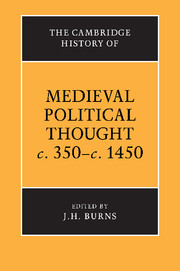Book contents
- Frontmatter
- Introduction
- I Foundations
- II Byzantium
- III Beginnings: c. 350–c. 750
- IV Formation: c. 750–c. 1150
- V Development: c. 1150–c. 1450
- 13 Introduction: politics, institutions and ideas
- 14 Spiritual and temporal powers
- 15 Law
- 16 Government
- 17 Community
- 18 The individual and society
- 19 Property and poverty
- Conclusion
- Biographies
- Bibliography
- Index of names of persons
- Index of subjects
- References
14 - Spiritual and temporal powers
from V - Development: c. 1150–c. 1450
Published online by Cambridge University Press: 28 March 2008
- Frontmatter
- Introduction
- I Foundations
- II Byzantium
- III Beginnings: c. 350–c. 750
- IV Formation: c. 750–c. 1150
- V Development: c. 1150–c. 1450
- 13 Introduction: politics, institutions and ideas
- 14 Spiritual and temporal powers
- 15 Law
- 16 Government
- 17 Community
- 18 The individual and society
- 19 Property and poverty
- Conclusion
- Biographies
- Bibliography
- Index of names of persons
- Index of subjects
- References
Summary
Towards the end of his classic six-volume scrutiny of medieval political thought in the west, A.J. Carlyle pronounced that
To the Western Church it was in the main clear that there were two great authorities in the world, not one, that the Spiritual Power was in its own sphere independent of the temporal, while it did not doubt that the Temporal Power was also independent and supreme in its sphere… This conception of the two autonomous authorities existing in human society, each supreme, each obedient, is the principle of society which the Fathers handed down to the Middle Ages, not any conception of a unity founded upon the supremacy of one or other of the powers.
In one important way, Carlyle was right. That Christ himself had separated the functions of king and priest was one of the axioms of medieval politics. And Boniface VIII's much-publicised burst of irritation at a French insinuation that he was unaware of that fact symbolises the western Church's adherence to the principle of dualism. Nor was that headstrong champion of the libertas ecclesiae any less doubtful than his predecessors that it was also axiomatic that the spiritual power was independent of the temporal. But a pope who claimed the papacy's right to institute the lay power ‘that it may be’ (ut sit), to judge it if it acted unethically, even to depose a lay ruler for serious, persistent political misconduct? This was surely to doubt the independence and supremacy of the temporal power in its own sphere, to reject the concept of an autonomous lay authority and to go on, by way of the ‘two swords’ allegory, to assert a unity of the powers founded on the supremacy of the spiritual. The argument that Unam sanctam was atypical and to be set aside as a serious misinterpretation of conventional papal theory before and after the pontificate of Boniface VIII cannot be taken seriously.
Dualism in fact meant different things to different types of ruler. The papacy accepted a principle of dualism but it was so fundamentally conditioned by another axiom, the superiority of the spiritual power, that it was in effect replaced by a unitary view of the two powers.
- Type
- Chapter
- Information
- The Cambridge History of Medieval Political Thought c.350–c.1450 , pp. 367 - 423Publisher: Cambridge University PressPrint publication year: 1988
References
- 16
- Cited by

